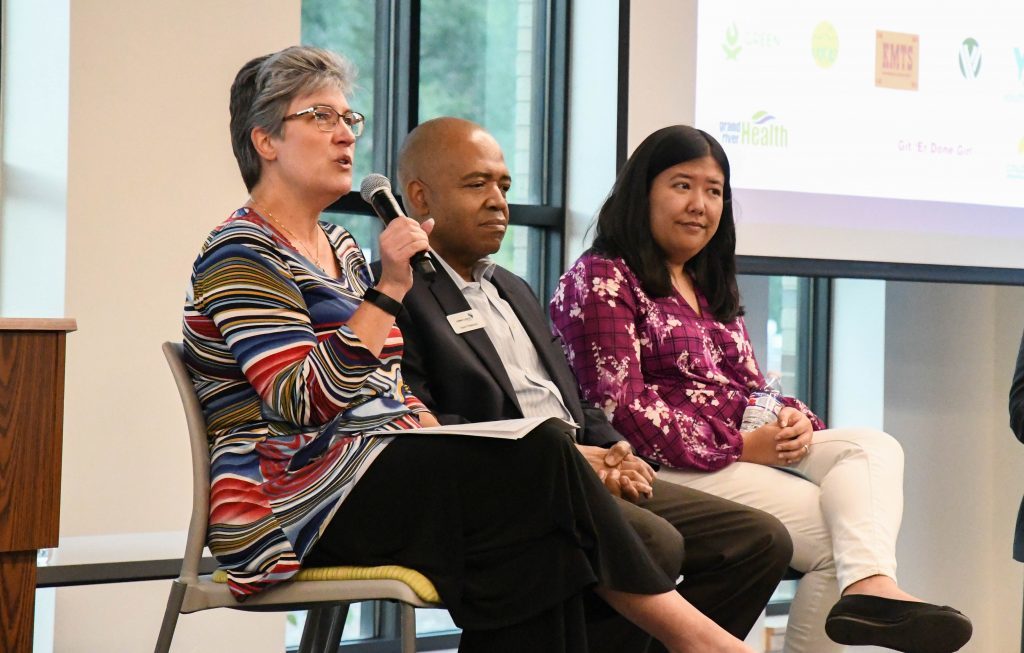Takeaways from Tuesday’s Longevity Finale

BY JOHN STROUD, POST INDEPENDENT
Frank King and the mythical George Bailey from the film classic “It’s a Wonderful Life” have something in common, the self-proclaimed “mental health comedian” related during Tuesday evening’s Longevity Project finale.
Giving the keynote address before about 80 people at Morgridge Commons to conclude the Post Independent’s series “Striking a Conversation: Mental Health for All Ages,” King said the power of starting a conversation can ultimately save lives.
His George Bailey revelation came after speaking at a dental conference, when a woman who was in the audience approached him and revealed that she, like King, suffered from what’s known as “chronic suicidality.”
The woman explained that, until hearing him speak, she always thought she was the only one who tended to come back to suicide as an option whenever things weren’t going well.
“That’s the power of starting the conversation,” King said. “People need to know they’re not alone, and maybe something I’ve said has taken them just far enough off that path. …
“And it hit me. I’m George Bailey. … I got a chance to see what other people’s lives would be like if I were not there to speak,” he said, using the analogy of that iconic moment in the movie when Bailey gets a glimpse of what life would be like in his hometown had he never been born.
“I cannot kill myself, because I would take all those people with me,” King said.
Attendees also heard from a group of panelists, including Carson DeFries, intergenerational program coordinator for the University of Denver’s Knoebel Institute for Healthy Aging; Kevin Patterson, CEO for Connect for Health Colorado; and Jackie Skramstad, clinical operations manager at Mind Springs Health.
Following are eight key takeaways from the event:
1. Connect
Skramstad said it’s critical to “demystify” mental health. That means being open about it and connecting with people who may be struggling, she said.
“We feel much more comfortable talking about other health issues, yet we still have a lot of reticence talking about mental health,” Skramstad said. “But the more we do it, the more comfortable we’re going to be. …
“As human beings we have a desire to connect to others to have a sense of belonging, and to have a purpose.”
2. Socialize
DeFries offered that it’s important to continually find ways to socialize with others and, as people age, to have a support network that can help them continue to engage.
Loneliness can lead to depression and anxiety, she said. That’s especially true for older people.
“If you have a group of friends you can count, it helps with your self-esteem, your sense of belonging and your sense of security,” she said.
3. Intergenerational sharing
Another key to maintaining a healthy mental well-being for seniors is to engage with younger generations, including younger members of the family, DeFries said.
“It’s important to bring different generations together to exchange ideas, share skills, knowledge and stories,” she said.
In particular, “the grandparent-grandchild relationship is really special, and it’s where you see a lot of benefits and impact.”
That also helps with the social development of the younger generations, DeFries said.
4. Unplug
Limiting exposure to the constant barrage of media, and especially that which can be divisive, is one key to maintaining a positive mental well-being, Skramstad offered.
That doesn’t mean not staying up on what’s happening, but knowing when enough is enough and to unplug on occasion.
“When I talk about limiting your exposure, yes, stay informed and know what’s happening, but be able to put your cell phone aside, or turn off the news, and limit how much you’re taking in,” she said.
5. Look for the positives
On the flip side of unplugging is to look for the positives amid all the negative, Skramstad added.
“How many times do people do random acts of kindness, and we just don’t notice, because we’re so busy. And yet we notice all the terrible things that are happening in the world.
“We don’t stop to see people being amazing human beings.”
6. Slow down
Patterson shared his perspective about understanding how the brain is connected to the rest of the body, and to recognize when it’s time to listen to the signals that the body is sending out.
“We have to figure out how to listen to it differently, and how to respond to it differently,” he said. “It’s also about how to help ourselves differently and seek that kind of support, so that we can move forward and try grow a little bit differently in our lives.”
Slowing down means taking time to take care of oneself, Skramstad offered. “Go out and find what brings you joy.”
7. Whole health
Panelists also spoke to the movement within the health-care community to provide a wide array of health services in one setting, including both physical and behavioral health.
“It’s about figuring out what’s missing, and then how do we fund and plug those holes,” Skramstad said.
Integrated health care is crucial, Patterson said.
Sometimes, a patient has a specific physical problem that they need to address.
And “sometimes they might just want to talk,” he said.
“I think that having a place where it’s comfortable and familiar, and that they know they can trust, is really, really integral.”
8. Share the step
Taking that first step to seek help for a mental health issue can be the most difficult part, panelists agreed.
But if someone can help walk that first step with them, it’s much easier, Skramstad said.
“I don’t know of a way to connect with people that doesn’t involve taking a step with them,” she said.
DeFries added that it’s good to “look inwardly” when trying to help someone else. “Think about what you like doing … and are there opportunities to share that with others.”